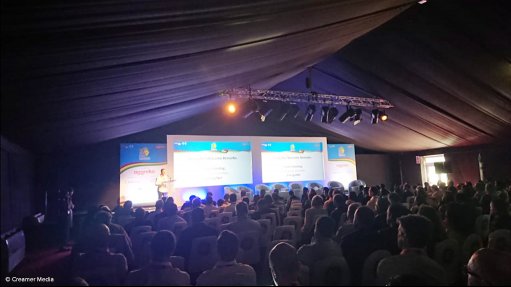
Photo by: Marleny Arnoldi
The pace of electrification in Africa has nearly tripled since 2012, relative to the previous decade, with electrification in sub-Saharan Africa surpassing population growth for the first time in 2014.
However, there is a long way to go to realise continental electrification, says Aggreko CEO Chris Weston.
Roughly 57% of the African population still does not have access to electricity – the largest such concentration in the world, he told delegates at the Africa Energy Forum, in Mauritius, on Tuesday.
Weston highlighted progress towards bridging that gap, including through the establishment of the Impact Hub, in Kigali, Rwanda, which launched a nationwide search for new solar energy solutions.
Further, in Nigeria, the government has outlined plans to deploy 10 000 new microgrids.
Weston noted clear trends in energy include the move towards renewables. “Between 2000 and 2012, there were 3.5-million people who enjoyed renewables-based power in sub-Saharan Africa.
“Between 2012 and 2015, this increased dramatically to around 18-million people, particularly from large-scale hydropower and geothermal [sources].”
He added that much of the policy and economic focus has been on renewables over the last few years and with good reason. “The cost of renewables continues to drop [and] energy storage is maturing – which, in turn, increases the utility of renewables solutions.”
Weston predicts that this will continue.
Renewables, taken in the context of a second trend, namely decentralisation, will have a big impact on Africa’s energy mix, said Weston, noting that power is increasingly being generated exactly where it is needed, which means the need for centralised power generation from large-scale power plants delivering baseload through national grids is decreasing.
“It could well be that within the next ten years the need for [centralised power] will fall away entirely, owing to not being enough of a cost-effective solution,” he stated.
Instead, there will be more localised energy sources and microgrids. Resultantly, more consumers will become independent from the grid, the cost of staying on the grid will increase and the trend to decentralisation will intensify.
Further, Weston discussed how, in a transforming energy world, thermal energy will be needed to ensure secure, uninterrupted power supply, while being deployed in innovative ways.
He explained that with renewable power sources being available intermittently, it is necessary for either storage solutions or fast-start thermal generation to provide power when renewable generation is not available.
“For many African countries, this is a genuine greenfield development opportunity, a far cry from the complex, costly upgrades involved in updating ageing Western infrastructure.”
Earlier this year, Aggreko installed its first-ever hybrid power plant, comprising 21 MW of thermal power capacity and 7 MW of solar photovoltaic capacity, in Eritrea. The plant allows the consumer to save money, hedge against fuel cost increases, and cut around 10 000 t of carbon dioxide emissions.